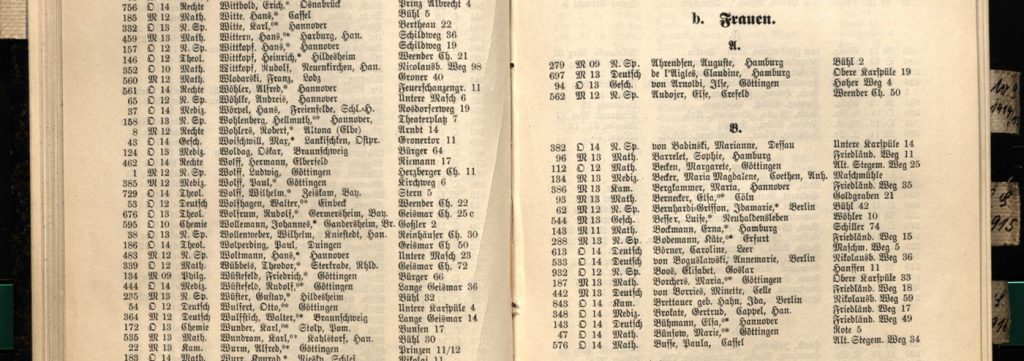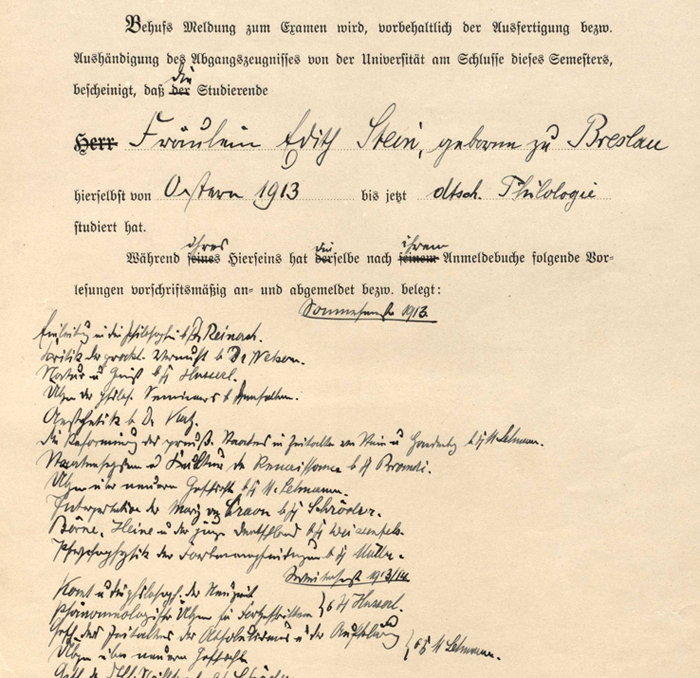Searching for the women of early phenomenology
We know there were many women who took courses with Edmund Husserl in Göttingen and Freiburg, and with Theodor Lipps and Alexander Pfänder in Munich. We know that some of these women were actively engaged in the phenomenological circles at these universities. But only in a handful of cases do we know much about these women beyond this. My research at the Center HWPS aims to uncover much more about the lives of these women. In particular, I want to know which women studied with Husserl and when, what lectures they attended, and which of them contributed to the phenomenological movement.
On International Women’s Day in 2014, I posted a list naming some of Husserl’s female students and other women associated with the early phenomenological movement on the website of the North American Society for Early Phenomenology. I had compiled this list with the help of Dr. Thomas Vongehr, relying primarily on the names of women I was able to identify in Karl Schuhmann’s Husserl-Chronik (1977). While further information about women such as Edith Stein and Hannah Arendt is easy to find, I was curious to learn more about the others, particularly their time as students of Husserl’s. The problem was figuring out how.
In December of that year, I traveled to Marburg to look through the Nachlass of Dietrich Mahnke. Among his papers, I found a document issued by the office of the Rector of the University of Göttingen which listed the courses Mahnke attended each semester. It dawned on me that I should not limit myself to books alone for researching Husserl’s students – there is a wealth of information preserved in official university records. Shortly thereafter, I began corresponding with the Göttingen University Archive.
Dr. Ulrich Hunger (the former archivist at the Göttingen University Archive) informed me that the document I had found in Marburg was an ex-matriculation or “leaving certificate” [Abgangszeugnis]. These were issued to students when they left the university for a reason other than graduating, such as transferring to another university for a semester. As luck would have it, such documents exist for many of Husserl’s female students. Similar types of documents are found in other university archives as well.
Using these certificates, I can partially reconstruct the lists of students who attended Husserl’s lectures. But this is only the first step of my research. I am currently using such lists in conjunction with correspondence and other archival materials from the literary estates of women phenomenologists to map out the broader social network of the early phenomenologists. This can help us to better understand the exchange and development of ideas in the phenomenological movement, and the place of women in it. But I face a number of problems. For one, to request the leaving certificates from Göttingen (if one even exists), I need to know the semesters that the student was enrolled at the university. The Husserl-Chronik does not always contain this information, so I need to look elsewhere. I rely heavily on two types of sources for this.

In most German dissertations from the early 1900s, there is a short curriculum vitae or biographical sketch [Lebenslauf]. The Lebenslauf lists the universities that the student attended and when, as well as the professors with whom they studied. This is useful in the case of someone like Hedwig Conrad-Martius, who did not complete her dissertation in Göttingen. Not only does her Lebenslauf indicate when she her years as Husserl’s student, but because she left Göttingen I know there is (probably) a leaving certificate that I can request. Dissertations also open-up another research strategy. If I can find a database of OCRed dissertations, then I can, for example, specify the years that Husserl taught in Göttingen and perform a search using the keywords “Lebenslauf”, “Husserl”, and “Tochter [daughter]” to find new women to add to my list.
I also rely on official university enrollment records. For example, for each semester that Husserl taught in Göttingen, you can find the Amtliches Verzeichnis des Personals und der Studierenden der Königlichen Georg-Augusts-Universität zu Göttingen. Many of these are available from The Center for Retrospective Digitization in Göttingen (Göttinger DigitalisierungsZentrum, GDZ). This strategy can work for other universities as well, if you can gain access to the enrollment records. (We are currently in the process of collecting the Verzeichnis der Behörden, Lehrer, Anstalten, Beamten und Studierenden der Badischen Universität Freiburg.)
If I know from a letter or, say, Edith Stein’s autobiography, that Frau Gothe was a part of the Göttingen Circle in SS 1913, I can search this name in the official student list for that semester, confirm her enrollment, determine her first name (Erika), and check the semesters before and after SS 1913 to see if she was enrolled then as well. This is how I know that Erika Gothe studied in Göttingen from WS 1910 until WS 1916/17. Unfortunately, the university does not have a leaving certificate for her, so I do not know exactly which lectures she attended. However, in the case of Gerda Walther, I was able to find all of this information. My transcription of her course enrollment documents from Munich and Freiburg are published as an appendix to my article “Gerda Walther and the Phenomenological Community,” Acta mexicana de fenomenología 2 (2017), 45-68.

Amtliches Verz. des Personals und der Studierenden der Königlichen Georg-Augusts-Universität zu Göttingen SS 1914, S. 88-89
How is all this information useful? In the case of someone like Hedwig Conrad-Martius, knowing which courses she attended can help us to understand her reading of Husserl, and thus how she understands phenomenology. That is incredibly useful for researchers trying to interpret her writings. What might be less obvious is the value in mining for this information in the case of Helene Weyl, Margarete Calinich, or Erica Sehl. I will address this issue in a future post.
– R. Parker
You cannot copy content of this page









